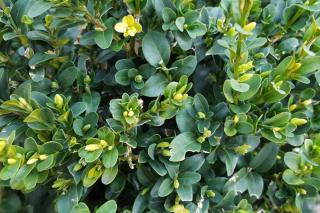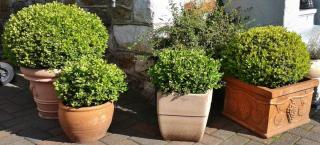

Green all year long, boxwood draws back to the elegance of French gardens. Along edges to organize the garden, or sculpted as as a standalone shape, it is currently making a comeback.
For a time reserved to the topiary ornaments of castles, boxwood now plays a part in all possible settings. It is often grown in pots, trimmed into clear-cut balls that decorate balconies of city-dwellers craving for greenery. One must state the facts: on top of staying radiant all year round, boxwood resists air pollution very well.
In a garden, it can mark the edges of walkways, surround flower beds and vegetable patches, and even dance along a lawn shaped in varied silhouettes: ball, pyramid, obelisk, spiral… It grows beautifully paired with heirloom rose trees, clematis, honeysuckles and light-blooming flowers like lavender.

Unless you are very patient, it makes sense to splurge for a boxwood plant that is already a few years old and well on its way to looking like the shape you want. That way, all you’ll have to do is a bit of maintenance pruning at the end of winter and summer. On a balcony, remember to rotate the pot regularly for even growth.
If you’re looking to sculpt your own specimen yourself, take note that a round ball is easier to trim than a straight line. Ready a template from a piece of cardboard with a half-circle cut in it, or rods and string, to guide your shears. If you’re ready for a more challenging eccentric shape, you can find animal-shaped mesh wire that you can slide your boxwood in, cutting whatever sticks out.

In pots, plant it in a blend of one part garden soil, one part soil mix and one part sand. Water regularly and add fertilizer in spring.
Laure Hamann